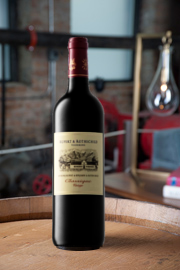- Analysis
- Vineyards
- Vinification and Aging
- Tasting Notes
- 2012 Vintage Notes
2012 Rupert & Rothschild Vignerons “Classique”
Wine of Origin
Western Cape
Varietals
55% Cabernet Sauvignon, 29% Merlot, 8% Shiraz, 5% Cabernet Franc, 2% Petite Verdot, 1% Pinotage
Analysis
Wine Maker: Yvonne Lester
Alcohol: 13.5% vol
Total Acidity: 6.1 g/l
pH: 3.57
Residual Sugar: 2.5 g/l
At the foot of the spectacular Simonsberg mountain in the Franschhoek Valley lies the historic French Huguenot farm Fredericksburg, established in 1690 and now home to Rupert & Rothschild Vignerons. It was in this valley over 300 years ago that the early French Huguenots first discovered a terroir similar to that of certain winegrowing regions in France. Hence their decision to settle and cultivate vineyards here. The average age of the vines is between 11 and 21 years old, and drip irrigation is utilized to maintain the vineyards.
Fermented in stainless steel tanks with extended skin contact. Malolactic fermentation occurred in French oak barrels. Matured for 17 months in 225 liter and 300 liter French oak barrels. The wine has an endless aging potential.
The wine opens with inviting black raspberry and ripe strawberry aromas, supported by an earthy “old world” elegance, and a strong mineral focus. A lingering cinnamon and walnut undertone give the wine a sense of softness on the finish. Decanting is recommended.
The 2012 growing season began with the third straight year of noticeably dry conditions, following a winter with lower-than-usual rain levels. That, combined with a cool start to spring, resulted in reduced fruit set. Many producers noted markedly reduced crop yields, but more concentrated fruit.

